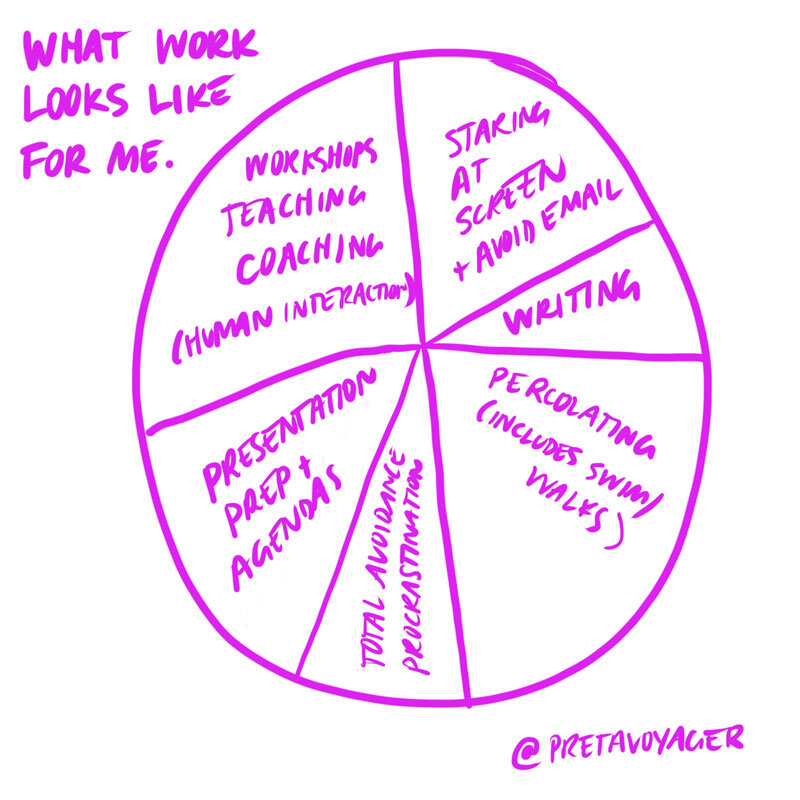What does work look like for you?
Awhile ago now I was having lunch with a friend and she asked me what I was doing that afternoon. “Reading,” I said, “to prep for a workshop.” ”That must be nice,” she responded.
Now normally, in the past I would have taken this the wrong way and felt guilty for reading, something that doesn't "look like work." But here's the thing that I've come to learn over the years: to do work right, it doesn't always look like work.
Reading for me meant re-focusing and giving myself the mindset and foundation for the 4-day workshop I'd be teaching. Reading sounds like a distraction, but really it was going to save me so much time in the long run. Not to mention, make my course even better for the students in it.
I had recently read Lizzie Wade's article "The 8-hour workday is a counterproductive lie" in Wired. The piece focuses on knowledge workers (aka people like me). As she points out, "There’s just one problem in 2019: It’s all but impossible to actually work for eight hours a day in the jobs so many of us now have." (Ha! And she was saying that in a pre-pandemic world.)
Like the author, I rarely have a week where I hit an 8-hour work day. It's not by lack of trying. Wade also references a Slack poll where writers were asked how much people worked. For most people it was 5-6 hours. In “pandemic working world” I now show up to [London] Writers’ Hour multiple times a day, and try to used that as my focused work. I’ve shifted how I think about work and two focused hours can be far more effective of a day of dragging on and multi-tasking.
The other key part of my day include a walk, often where I’m listening to a podcast. It’s my way of ensuring I get different perspectives. Did anyone in school or life tell me that the secret to success was taking a walk? No! But I know it’s essential for me. Long ago I discovered my best ideas don’t come from sitting in front of a computer, but from swimming or walking.
The secret is figuring out your best working style so you can thrive. It may not look like everyone else’s. Once we stop comparing ourselves to others, and realize that what we thought was the norm really isn't is when we can start doing the real work.
I've long realized I need "percolation" time to process ideas. In traditional workplaces it stresses me out to see how busy, stressed, and how many deadlines people are juggling. How can anyone think straight? I’d much rather spend the time doing something right the first time than it taking 10 times longer due to distractions and careless mistakes. We’ve lost the ability to pause and and questions to make sure we’re even working towards the right goal.
I have a theory that people could do more, better work if they'd slow down and give themselves time to think. Somehow society has trained us to think we're not worthy or we're doing something wrong if we don't constantly have a lot on our plates. When you manage others or have a people dependent on you, it only adds to the pressure. The way I’ve reframed the question would be, how can I effectively support others if I’m not taking care of myself?
We have this twisted view of what work should look like. And when it doesn’t look like how we think it should, we can think we’re doing something wrong. But what if everyone else has it wrong, and we actually have it right?
What if working ALL. THE. TIME. was not the only way to approach work? And what if productivity was all backwards?
I’m curious, what does your work day look like for you? Does it excite you? Overwhelm you? Do you feel guilt? Or alive?
Anne S. Ditmeyer is a creative coach and workshop facilitator. She works 1:1 with clients to support them on their journeys, and a group/support setting through Mapping Your Path which opens a couple times a year. Join her for her next 2-hour workshop Write Your Own Rules to write your own set of guiding principles on March 26 or March 28th and get a jump start on how you want to show up to your own work and life.

